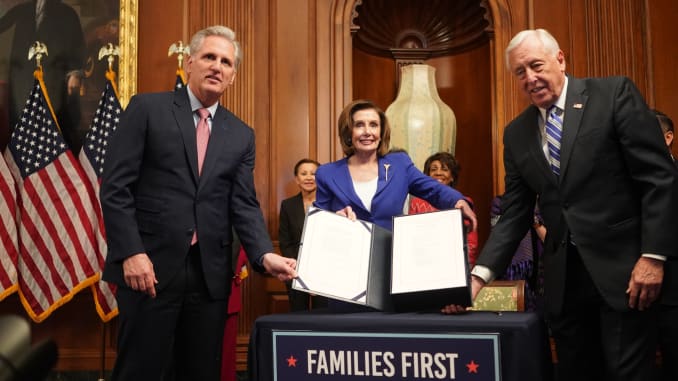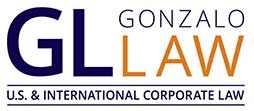
Photo Credit: CNN
In the largest emergency
spending measure in U.S. history, the Coronavirus Aid, Relief, and Economic
Security Act (CARES Act) passed the house, senate, and was signed into law today
by President Trump within hours of receiving it to his desk. The measure became law in lightening speed
looking to deliver emergency relief in the form of a tidal wave of cash to
individual Americans, businesses and health care facilities all reeling from
the coronavirus pandemic across the United States. The new law will deliver a massive $2
trillion in emergency spending to Americans and many of their companies. Here are the details! See if your family and company are able to
benefit.
Coronavirus
Aid, Relief, and Economic Security Act (CARES Act)
What is it? A $2 trillion stimulus bill to respond to the pandemic, including cash and assistance for regular Americans as well as businesses hit hard by the virus. Its purpose is to provide emergency relief due to the coronavirus pandemic.
When does it take effect? The Senate and House have passed the bill and President Trump have signed it into law within 48 hours.
What are the key details?
Direct payments to individuals: tax credit
- Individuals who earn $75,000 in adjusted gross income or less: direct payments of $1,200 each
- Married couples earning up to $150,000: direct payments of $2,400, an additional $500 per each child.
- No payments for singles making adjusted gross income of $99,000 or more and $198,000 for couples without children.
- Would be received in the form of a tax credit similar to how tax rebates are received, after taxes are filed.
Unemployment Benefits Extended
- Jobless workers receive an extra $600 a week for four months on top of their state benefits.
- Up to 13 weeks of extended benefits, fully covered by the federal government.
- Pandemic unemployment assistance program; provides jobless benefits to those who are unemployed, partially unemployed, or unable to work due to the virus. This includes independent contractors, self-employed, and gig economy workers (such as Uber).
$500 billion lending program. The Treasury Department provides $500 in loans: $25 billion for passenger air carriers, $4 billion for cargo air carriers and $17 billion for businesses that work in national security, the remaining $454 billion, are given wide latitude to provide loans to businesses, states and municipalities
Mid-size businesses between 500-10,000 employees, as well as non-profit organizations, do not have payments due on loans for the first six months after issuance.
Federally elected officials receive no benefits. Businesses that are owned or partly owned by “the President, the Vice President, the head of an Executive department, or a Member of Congress; and the spouse, child, son-in-law, or daughter-in-law” will not receive benefits. The provision applies to anyone with 20% or greater stake in a business.
Foreclosures and evictions’ protection
- Anyone facing financial hardship from the virus receives a forbearance on federally backed mortgage loans for up to 60 days with no penalties, which can receive extensions for four periods of 30 days each.
- Landlords with federally backed mortgage loans who have tenants would also not be allowed to evict tenants solely for failure to pay rent for a 120-day period, and they may not charge fees or penalties to tenants for failing to pay rent.
Hospitals and airlines receive benefits
- $100 billion public health and social emergency fund: $65 billion go to hospitals, the rest is directed to doctors, nurses, suppliers, etc. who are facing increased expenses and lost revenues due to the virus.
- $32 billion in grants for wages and benefits to the airline industry: $25 billion for passenger airlines, $4 billion for cargo airlines, and $3 billion for industry contractors, such as those who handle catering, baggage, ticketing, and aircraft cleaning. Another $25 billion for passenger airlines and $4 billion for cargo airlines will be available in the form of loans or loan guarantees.
- Airlines may be required to operate routes that they would prefer to cancel due to low profitability to help service small & remote communities that are suffering from the virus.
- Companies that receive the assistance are barred from making furloughs, pay cuts, or stock buybacks, and from issuing dividends to investors, through September. It also institutes a limit on executive compensation.
- For additional details on how the new law affects student loan payments, gig workers, and independent contractors, see also the full text of the law cited below and also a recent CNN article.
Article By Nouvelle L. Gonzalo Esq. and Brittany George
Nouvelle L. Gonzalo, Esq. is a U.S. and international corporate lawyer who works with companies across the globe. She is the managing attorney of Gonzalo Law LLC, a U.S. and international corporate law firm with offices in Florida and Ohio. In addition to the active practice of law, she has served as adjunct faculty of international corporate law for several years. She was recognized as a rising star by the national organization, Super Lawyers, in 2019 and 2020. Her practice areas include: international corporate law, intellectual property law, and nonprofit law. You can contact her with any questions or for a complimentary consult at [email protected].

Brittany George. Brittany is a student associate with Gonzalo Law. She has a sharp mind and an eye for detail. Brittany focuses on our corporate and legislative research.
References
CARES Act (2020). https://www.congress.gov/bill/116th-congress/senate-bill/3548/text#toc-id8DE131D9B4404479A3A99BA0E37DCE2C
CNN (2020). https://www.cnn.com/2020/03/25/politics/stimulus-package-details-coronavirus/index.html

